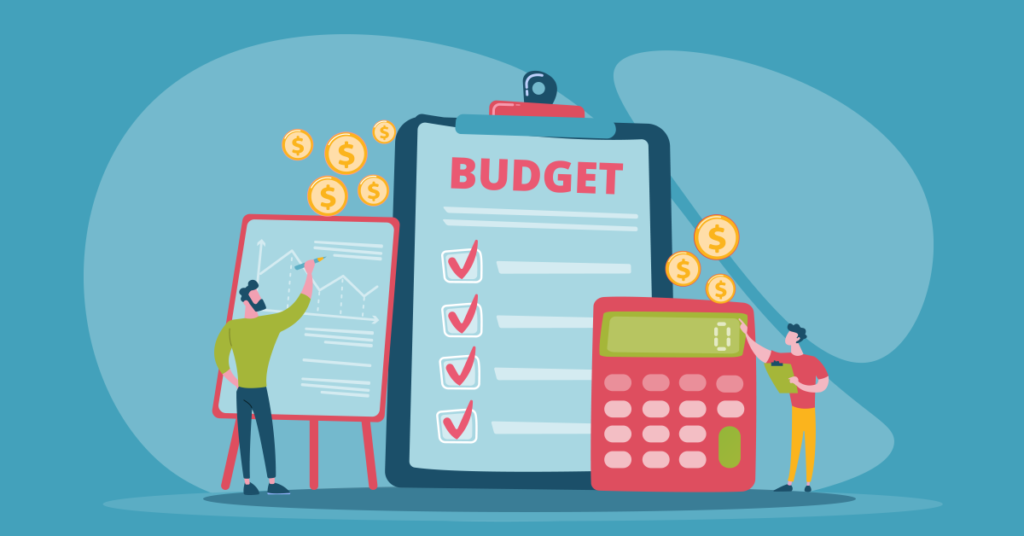Startup Budget Plan: How to Create and What Affects the Cost of Developing a Medical App
Making a budget for a startup business is one of the crucial processes entrepreneurs must undertake to assess the anticipated income, costs, and cash requirements. Setting up your business for success requires developing an acceptable budget. We have simplified the concept of budgeting and planning into an explicit, step-by-step instruction since it might be intimidating. Read about it in our article
What is a Startup Budget?
A startup budget simply explains how you intend to use your resources. It represents the overall expense incurred to complete the project activity. In addition, it is necessary to obtain project approval, ensure finances are available and assess performance.
The Importance of Budget Planning For a Project
Understanding the value of budget planning from a project’s inception is essential. Creating a budget will help you prevent early financial blunders and ensure the project is carried out as planned.
- You can maintain the project on schedule if you push to stick to a budget. Too many projects fail because unaccounted-for expenditures prevent them from being completed. Realistic budgets increase the likelihood that one will complete a project.
- It provides a more accurate estimate of your break-even point, allowing you to determine when to change essential factors.
- Define priorities. You will be able to determine the priorities for the project by developing a budget. This action will support your decision-making and guarantee the project is finished successfully. This phase is crucial to make sure you can complete your project.

- Make it easier to make decisions. For example, this might involve selecting whether the project goes on or how much money to invest in various project tasks.
- Reduces costs and time. An essential aspect of a project is planning its budget, which helps reduce costs and save time. You may ensure the project stays within the budget once you have made the necessary preparations. In addition, you won’t be able to gauge the project’s efficiency if you can’t compare actual and predicted expenditures. You can manage the project more successfully by developing a thoroughly thought-out budget.
- It opens the estimate of costs. Understanding the project’s expenses will be crucial for carrying out the project. This will be crucial for obtaining funds and ensuring you can finish the project as planned. You won’t be able to understand your project’s costs without an appropriate budget.
Types of Budgets for a Startup
Now that we’ve discussed why a budget is essential to a startup’s success let’s look at the different types of budgets. There are two major types of budgets; however, there are numerous variations you may use them for:
One-Year Budget: This kind of budget projects expenditures monthly, weekly, or even daily. Creating a profit and loss (P&L) statement and a rolling budget is acceptable. Since most companies are pretty dynamic, they must do risk management quickly. It is advised to prepare for shorter rolling periods in the firm’s early years, such as monthly or quarterly, and then yearly budgets once the company has expanded. Creating a monthly or quarterly budget facilitates future planning.
Long-Term Budget: Typically, businesses in the development or maturity stage choose to create a budget with a longer time horizon of three to five years. This kind of budget offers a prediction of long-term financial objectives. A beginning firm might create a more extended budget based on goals and industry standards. However, throughout the first several years, these may require regular changes.
Creating a Budget for a Startup
Making a budget might seem overwhelming if you’ve never done it before. However, you can still come up with a workable starting budget without being able to anticipate the future or estimate expenditures down to the last penny. With your expertise in development, some of these figures may already be in your possession.
Let’s now go through the whole methods by which you may start creating your starting budget.
Step 1: Set a specific budget and assemble your resources
You can manually create your starting budget if you take a notepad. Alternatively, you can expedite the procedure by using the budgeting tools of well-known corporate accounting software. In addition, your general budget is instantly updated when you integrate them with other financial instruments, such as your business bank account. This eliminates the need to search through each app to locate your monthly expenditures.
Spreadsheets tools like Google Sheets or Microsoft Excel are additional user-friendly budgeting tools. Anyhow, there are many available free startup budget templates. Choose one first that has the chronology you want and an easy-to-understand structure. After that, add test data to the spreadsheet to check the calculations. In this method, you won’t spend hours entering data just to discover that the spreadsheet isn’t functional.
As you add up your must-have items, setting an early budget plan can help you remain on track. Remember to account for a little emergency reserve. Budget for unforeseen circumstances as this may first be out of your price range. Entrepreneurs start their planning with costs since they are considerably simpler to anticipate.
Step 2: Detail your sources of income
Knowing where your money could come from is essential when creating a budget. Utilizing client profiles to estimate purchase frequency is a proper technique to determine your revenue. Additionally, you may group prospects according to geography, anticipated conversions, etc. This is made more accessible by good CRM software. Calculating your break-even outcomes is another approach. When estimating possible revenue or financing sources, such as loans, savings, or investment income, always be cautious of being realistic. Talk with your sales and marketing departments to select fewer projects to take on. To this anticipated sum, always add a lump sum for unexpected chances. Finally, verify that each item on your list can be addressed and is feasible.
Step 3: Sort costs into revenue categories
Here’s a simple technique to simplify things. First, divide your operational and capital costs. You may frequently need to compare current and prospective investments thoroughly. Make sure to include any financial details about each project step as you go along. Your capital spending will be compelled to match your long-term financial objectives.

Step 4: Identify the variable costs
As the name implies, these costs will vary with your sales and output.
Travel expenses and General & Administrative expenses are included in this category. As I stated, you may estimate them on preliminary data but establish quantified assumptions for everything. Make a quick roundup after your fixed and variable costs have been roughly determined to make your beginning budget reasonable.
Step 5: Give room for Interest and Taxes.
You must be prepared to pay interest if you grow a debt, but we hope this is not the case for you. On the other side, you will earn interest if you have a significant cash amount.
Additionally, you will need to account for annual taxes, which might vary depending on the state. Finally, recognize that any net operational losses you experience might result from prior failures. Therefore, before choosing an objective, make sure you take into account these aspects.
Step 6: Estimates should be made for financial statements
When creating your budget, estimates for financial statements are essential for a startup. You could be tempted to ignore capital expenditures and merely project your profit and loss (P&L). But go one step further and estimate your balance sheet and P&L for a detailed cash flow forecast. When you accomplish this, you will know how much financing you need. Then, create a map of your assets and obligations to ensure that you never have delays or a lack of money.
Step 7: Connect up with every department.
This means that everyone on the team, including department heads, senior management, sales, HR, and R&D, should review your total budget. You should check that your budgeting plan makes sense in practice as a startup. Give budgeting the priority it deserves via internal organizational talks if you want your firm to develop quickly.
What Affects the Cost of Developing a Medical App
Pre-build, development, and post-development stages evaluate an application’s development costs.
Costs associated with planning and research are incurred during the pre-build phase. The second stage involves estimating the development costs for each app component. In the third step, you may evaluate the cost of deploying the app maintenance.
Depending on their use, digital healthcare technologies and products vary. The most distinct groups are:
- General Health & Wellness Tools (such as fitness, learning, and productivity apps)
- Professional Healthcare Tools (for example, consulting and appointment scheduling apps)
- Besides the objective, the costs depend on tools, architecture, regulations, and developers.
Let’s look more closely at the variables that affect how much it costs to develop healthcare apps.
Application Design
The costs of developing a medical application will depend on the design phase. Changing your app from wireframes to the user interface, whether it is a primary or sophisticated app, requires more effort and more inventive mobile app designers. However, creating a medical application with a basic design is less expensive than doing so with a sophisticated one.
Features of the Application
The features and functions you add to an app will impact the development cost of such an application in the medical industry. It indicates that establishing a healthcare app with minimal features will be less expensive than designing one with sophisticated features and complicated functions. Therefore, before including features, confirm whether the integrated component is relevant to your program or not.
Development Platform
It is the second most significant factor affecting the cost of developing a medical application. The cost of your application will depend on the app development platform ( such as iOS or Android) you select.
Time Taken in Development
The total cost involved in development closely relates to how long it takes to develop an application. That is, the cost of developing an app is closely linked to the time to market. For example, project delays or modifications to third-party element integrations will lengthen timescales and raise the cost of developing medical applications.
Size of the Team and Developer Ability
Leading mobile application development firms with a piece of good market knowledge and necessary resources may deliver a perfect medical application promptly. However, a mobile app developer with smaller teams must employ additional people to close the skills gap in the app development team. The estimated cost of developing an app might go up as a result.
Compliance and Regulations
As opposed to other mobile applications, medical applications must be created following the nation’s regulatory agencies. If not, your application will attract fines based on the size of your company.
Tips For Creating a Budget For a Startup
It should no longer be surprising that budgeting is a difficult task. When creating a startup budget, you may run across several issues, from money shortage to budget adherence. The following advice will assist you in developing a budget for your startup:

- First, spend as little as possible initially.
- Then, create your budget using the accounting tools your firm already uses.
- Start keeping budgets immediately since many banks want years’ worth of cash flow statements and other financial records.
- Consider low sales and high costs.
- To find out how much other mentors or advisers are charging for essential items, get in touch with firms of comparable size in your sector.
- Make sure your projections are fair, considering the market, industry, and size.
- Take seasonality into account when calculating sales.
- Consult experts to assist you in creating your initial budget.
Conclusion
We quickly discussed the significance of having a solid budget for a business and the several types of budgets you may choose from. Then, we received in-depth explanations of the actions you should do to create a startup budget. Lastly, we covered the variables influencing the price of producing a medical app and tips for creating a startup budget last.
It is acceptable to state that a young company’s first line of defense has a planned budget. It’s a flexible plan of action that enables you to adjust to developments and foresee financial shortages. You already have an advantage over two-thirds of the competition if you take the effort to create a well-defined budget.

Subscribe to us










